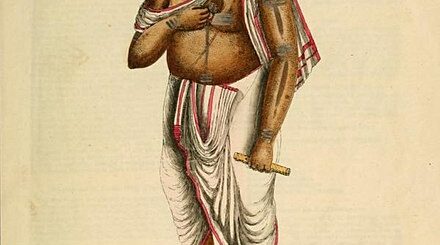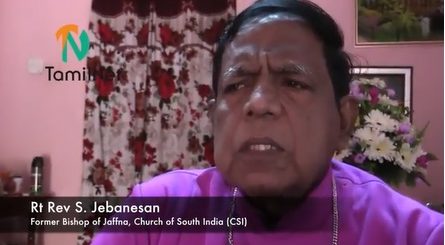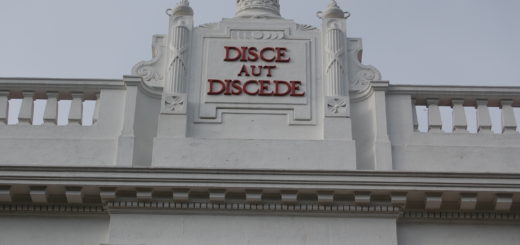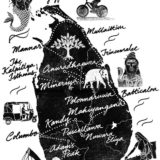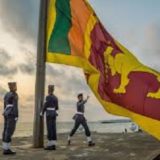Arabified Muslim bombs ticking under Ranil’s chair
The shock of the Easter Sunday bomb blasts shattered within minutes the comforting beliefs of a nation that had settled down to recline smugly in peace for generations to come. Lulled by the sense of security that restored confidence in the dawn of a new era at the end of Tamil Tiger terror in May 2009 no one expected Muslim bombs to blast the faith in a non-violent society fought and won in a 33-year-old war (i.e., from the declaration of war in the Vadukoddai Resolution in May 1976 to Nandikadal in May 2009). The impression created before Easter Sunday was that the nation was moving towards reconciliation and peace. Ranil Wickremesinghe-NGO combination was marketing “reconciliation” as their latest trump card to publicise their brand of politics as a great success. Consequently, the word ”reconciliation” tripped off the lips of all the political pundits to explain the good, the bad and the ugly in the Yahapalanaya regime. It is a word that gained currency at national and international levels to justify the betrayal of the overall national interests to the extremist demands of the minorities. In fact, Muslim extremism gathered momentum under the soothing cover of “reconciliation”.
Ranil-NGO combo believed that their much-publicised programme of “reconciliation”, like the flopped Sudu Nelum Movement of CBK-Samaraweera, or the Cease Fire Agreement (CFA) of 2002, had restored normalcy and stabilised the nation. Anyone opposing their failed politics was accused of sabotaging “reconciliation”, or being provocateurs of racism. Even the EU is justifying their attack on the local media by accusing the latter of harming “reconciliation and peace”.
They accuse the media of provoking incendiary racism ignoring the explosive ground realities, as revealed in the Parliamentary Select Committee (PSC). The grim reality is that there was no need for the media to demonise the Muslims. The Muslims had done it themselves by going along with the suicide bombers, wittingly or unwittingly, not expecting the ideological fanatics to go to the extreme of pressing the button to relish instantly the 72 virgins in heaven by creating hell on earth. The Muslim leaders had been a part of the process of establishing brain-washing madrassas that mushroomed in every available nook and corner. They also went along with the importation of hundreds of radical preachers inculcating politicised Islam to make Sri Lanka a part of the global caliphate. They prepared the ground for Zahrans to emerge and grab power. Predictably. when the non-Muslim majority reacted, as any majority would, to the violent and destabilising consequences of such radicalisation the blame came down on them for violating the rights of minorities. In other words, in their book of values and rights only the minorities have rights to do whatever they want. And the only right of the majority, according to them, is to surrender to the right of the minority to violate whatever rights that are left for the majority.
The media, for instance, doesn’t have to provoke anti-Muslim hatred at all. That work was done with precision inside the madrassas which were insidious cells for sowing the seeds of hatred against non-believers. It is unrealistic in the political world to expect love to come out hatred. And out in the electorate the multi-billionaire Zaharan gave the finishing touches to the anti-Muslim resentment. Zaharan’s bombs has unfortunately tainted all Muslims as unreliable partners in a peace-loving society.
The Muslim witnesses at the PSC exposing the internal machinations of rival Muslim sects fighting each other have only reinforced the fears generated by Muslim politics propagating varieties of extremism. One of the main threads that was exposed at the PSC was the intra-ethnic and inter-ethnic hatred. When the groundwork for spreading hatred was done by the Muslims, with the state looking the other way under the pressures of the Muslim leaders, why should anyone blame the media or the Sinhala-Buddhists? Besides, when the Muslim leaders went on their bended knees to suck up to Zahran and their Arabic agents abroad, media didn’t have to cook up stories against the Muslims. PSC has heard enough and more stories of Muslims demonising their rival Muslims. The role of the media is to report those stories. And if Islamaphobia has reached a new level of intensity, which is inevitable given the horrendous slaughter of Christians at prayer, it is stupid to blame the messenger.
Without anyone’s help the actions of the Muslim extremists were sufficient to generate instant antagonisms against the whole Muslim community. Take, for instance, the role of M.L.A.M Hisbullah, the former governor of the Eastern Province. His attempt to spin yarns to cover up his tracks is hilarious. His record indicates that his political goal was to exploit the rising Muslim radicalism to be the new Muslim messiah in the East, with prospects of rising to be the first caliph of Kathankuddy. In one way or another, the Muslim leadership was giving a nudge-and-a-wink to Islamic radicalism hoping to ride into power on the back Muslim fanaticism. The Muslim leaders did not gather round Zaharan merely to get a share of 2,000 odd votes, as stated by Hisbullah. They were at his feet to benefit from the rise of radical Islam as a political force to confront the state and the Sinhala-Buddhist majority. It was when politicised Islam backfired on them on Easter Sunday that they tried to distance themselves from Zaharan. Now that Zaharan is not there they are quite brave in denouncing him.
The Arabification of the East was the first step. Either through acts of commission or omission Hisbullah had thrown his weight behind it. But he fronts up before the media and the PSC pretending to be the much misunderstood Sri Lankan patriot who is vilified for discovering the miracle of cooling the sun-scorched earth in the East by planting date palms.
So who is provoking racial antagonisms? Is it Hisbullah saying that the global Muslim community will drop everything and come rushing to save the Muslim minority from the Sinhala-Buddhist majority? Or the media reporting it? In any case, if the EU has any evidence of the media inciting racial hatred it should take the case with substantial proof to the Press Council instead of regurgitating the bull dust fed to them by the NGOs they finance for their benefit. Why is the EU rushing into places where knowledgeable angels fear to tread? Reconciliation and peace cannot and will not come because EU blames the media. EU is merely using the current jargon of “reconciliation” in the absence of substantial evidence. It is the buzz word of “reconciliation” that has become the sword and the shield to cut down the Sinhala-Buddhist majority and defend the anti-Sri Lankan politics respectively.
Ranil, as usual, has misread the subterranean forces undermining his euphoria. He is in the same smug, self-congratulatory mood that intoxicated him after signing the CFA with Prabhakaran in 2002. Then he thought that appeasing Prabhakaran was the way to end the war. Now he thinks that appeasing minoritarianism is the way to achieve “reconciliation”. But the history of ethnic politics has proved that the more you appease the minorities the more they escalate their demands and/or violence.
Reconciliation, in fact, has become a dirty word. In the post-Prabhakaran period, “reconciliation” has become a convenient tool to put pressure on the government to promote and extract concessions to the extremist demands of minorities. And the Yahapalana-ya-kos seems to be ever ready to go along with those demands, of course, in the name of “reconciliation” which means giving in to ever escalating demands. The Ranil-wing of the Yahapalanaya government was obliged to give in to the Muslim demands for one reason: the evidence of the former Governor of the Eastern Province, M. L. A. M. Hisbullah, has proved that the Ranil-NGO-Yahapalanaya government rode into power on the votes and backing of Zahran Hashim. And Ranil hopes to do that again in the coming elections.
Hisbullah confessed that Zahran had the power to summon the entire Muslim leadership and dictate terms to them. The Muslim leaders signed an agreement not to even play music at their meetings. This makes it clear that at the peak of his of power Zahran and his politicised Islam radicalism was the source driving Muslim politics in the mainstream. Either directly or indirectly the Muslim leadership was in cahoots with the rising tide of Islamic radicalism. And they rushed to Police stations to lodge complaints against Zahran and the radicals not to save Sri Lanka but to save their own skins. They saw the radicals rising as a rival power challenging their supremacy in the Muslim enclaves. Radical Islam was a serious threat not only to traditional Islam but also to the power base of the Muslims in the parliamentary mainstream. The young radical Islamic Zahrans were emerging as a formidable threat to their vote banks. They rushed to the Police stations hoping that the state would step in and crush the Muslim youth gaining popularity and votes. At the same time, they had no compunction in rushing to sit at Zahran’s feet and agree to his radical demands and even signing agreements with him. They wanted to have it both ways.
They not only wanted to plant the date palms but also eat the fruits of it. Islamic radicalism could not have grown to the peak of Easter Sunday without the blessings of the conventional Muslim leadership using their influence to anesthetize the state into believing that they were their “boys” who were merely toying with Chinese crackers. Of course, they did not go as far as the Tamil leadership that embraced the Tamil terrorists as their “boys”. But they were near enough especially with the funds pouring in from the Middle East to consolidate the power of radical Wahabism. They joined heartily and became an integral part of the Arabification of the East. And there was a degree of pride in the Muslim community heading in the direction of Arabification. It meant abandoning the Sri Lankan identity and identifying totally with the Arabic identity. For instance, their argument at the PSC was that they had the right to learn Arabic to understand and study the Koran just as much Buddhists had the right to learn Pali to study Buddhism. Plausible, indeed! But the underlying fact is that Buddhist didn’t learn Pali to establish a Buddhistan. The Muslims, on the other hand, were learning Arabic to prepare for a Bagdhadidstan / caliphate, excluding all other communities. Conventional Muslims were content in going to Mecca and returning with the religious title of Al Haj. But politicised Islam was bent on transforming the East into the first caliphate this side of the Suez. Sri Lanka was faced with the proverbial camel that crept into the Arab’s tent.
Ranil was responding to the Arabification of the East as if it was an anodyne variation of Buddhism. He was not inclined to confront the Arabification of the East because Muslims, by and large, were with him. His calculation would have been simple: a growth in Muslim votes would be a growth in UNP votes. It is, of course, a known fact that the mainstream Muslims were mainly with Ranil. And the Muslim leaders in his camp had the power to directly influence and manipulate Ranil. There exceptions like Badurdeen Mohammed, the Bandaranaike loyalist, C. A. S. (Sinhala) Marikkar, and Alavi Moulana. But the general trend was to go along with the UNP.
According to Hisbullah’s statistics Zahran was in command of around 2,000 votes. But Zahran was more than that. He was gathering momentum and becoming a force to reckon with. It was a force that the Muslim leaders could not ignore. They were, of course, pushed into a position of kissing the hand they could not cut. Besides, Zahran’s power was not confined to votes. He had money. Tons of it! Police estimate that his asset amounted to Rs 7 billion. He had Rs 140 million in cash alone. In other words, National Thowheed Jama’ath (NTJ) had the resources to buy a majority in the Parliament at Jayewardene Pura, if they had planned to do so.
Clearly, the Muslim leadership had acquired enough power, through electoral and parliamentary votes and money – tons of it! — to manipulate the Ranil-wing at the core of the Yahapalanaya regime. They had aligned themselves with Ranil Wickremesinghe partly because he had enhanced his constitutional power after the 19thAmendment. The hidden agenda of this Amendment was to devolve Presidential power to the Premier’s office. Ranil was hell bent on transferring Presidential powers to the Premier’s office because he knew that his chances of becoming president are as great pigs developing wings to fly. And more importantly, because the Muslims knew they could easily manipulate Ranil who was dependent on their votes to stay in power. There was a quid pro quo arrangement. You-scratch-my-back-and-I’ll-
The Ranil-wing was only too willing to let the minorities get away with their extremist acts and demands just to stay in power. Muslims could get away with raping the Wilpattu forests. Neither the President nor the Prime Minister knows who raped the forest to this day. In fact, the Ranil-NGO “reconciliation” programme was so successful that Mullahs were packing their Mosques with swords – believe it or not — to cut grass! Ranil must have thought that it was the Muslim equivalent of Christians turning swords into ploughshares!
The Muslim leaders who are with Ranil can be categorised, to some extent, as proxies of Zahran. It is obvious that Ranil was under pressure from the Muslim leaders who were under pressure from Zahran. So “reconciliation” was another name for pushing the violent extremism of Zahran who dictated terms to the Muslim leaders. When Hisbullah told the Parliamentary Select Committee pointing a finger at former Minister Rauf Hakeem, who is now sitting as a member of PSC, that even he signed the agreement with Zahran, Hakeem could only wriggle in his chair and grin sheepishly, virtually acknowledging his guilt.
This is the tragic and pathetic state of power play in Sri Lankan politics today. Altogether they are wallowing in the same putrid swamp. The word “reconciliation” has lost its force and meaning because the minorities are using it as their tool to dictate terms to the majority. Reconciliation is a two way thing. But Ranil is using it as a one-way instrument to appease his Tamil and Muslim vote base and his Western and Indian partners.
This is his last gamble. On the one hand, he has lost his traditional Catholic base. The Catholic Church is coming out strongly against Ranil. Even his Cabinet Minister knew what was going to happen on East Sunday but no one informed Cardinal Malcolm Ranjith who would have closed the Churches that day, if he knew what Ranil’s Minister knew. More than that, Ranil has galvanised the sleepy Buddhist electorate which was reconciled to accept “reconciliation” (Ranil’s version of it) as the next step. Ranil was also on high after his Supreme Court victory on the constitutional issue of the President sacking him.
Then came the Muslim bombs. Rightly or wrongly, it has blasted the image of the Muslims as a trustworthy community willing to live in peace with the other communities. More importantly, it has blasted Ranil’s chances of contesting as a candidate at the coming Presidential election. His image is linked too closely with the Muslims. This image has magnified manifold in the post-Zahran days. Even sections of the Tamils too are not pleased with the rise of Muslim fanaticism.
But it is the instant and instinctive reaction of the majority to Easter Sunday that has sealed the fate of Ranil. Ranil and UNP are now at the same point as Sir. John and the decadent UNP was in 1956, facing S. W. R. D. Bandaranaike. Ranil seems to be aware of it. He is desperately trying to wrap himself with a myriad national flags. The background to his recent TV appearances was covered from wall to wall with a line of Sri Lankan flags.
Can he fool the people with his optics? Can his cheap cosmetics beat the renewed power that radiated from the bed of Athuraliye Ratana Thero fasting at Dalada Maligawa? Ranil will try. But it is clear that another “1956” is on the way if the opposition can pick another Bandaranaike with national security, national identity and national prosperity listed as priorities in the next manifesto.

